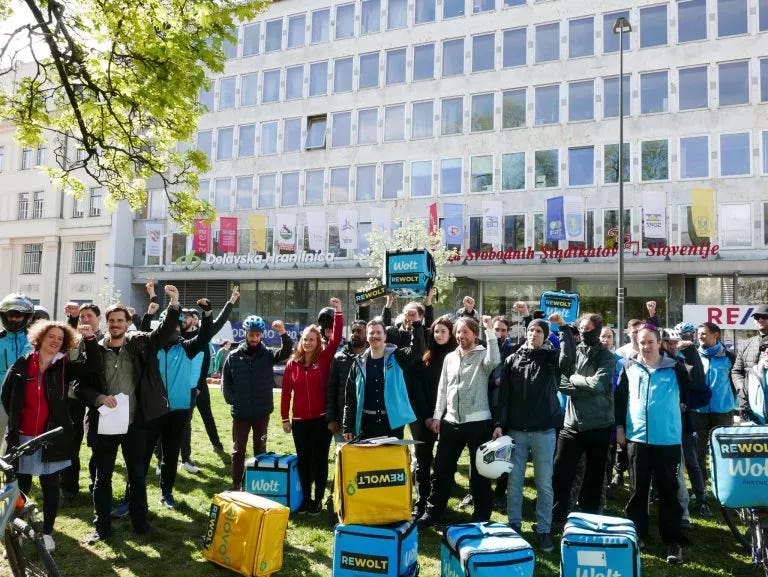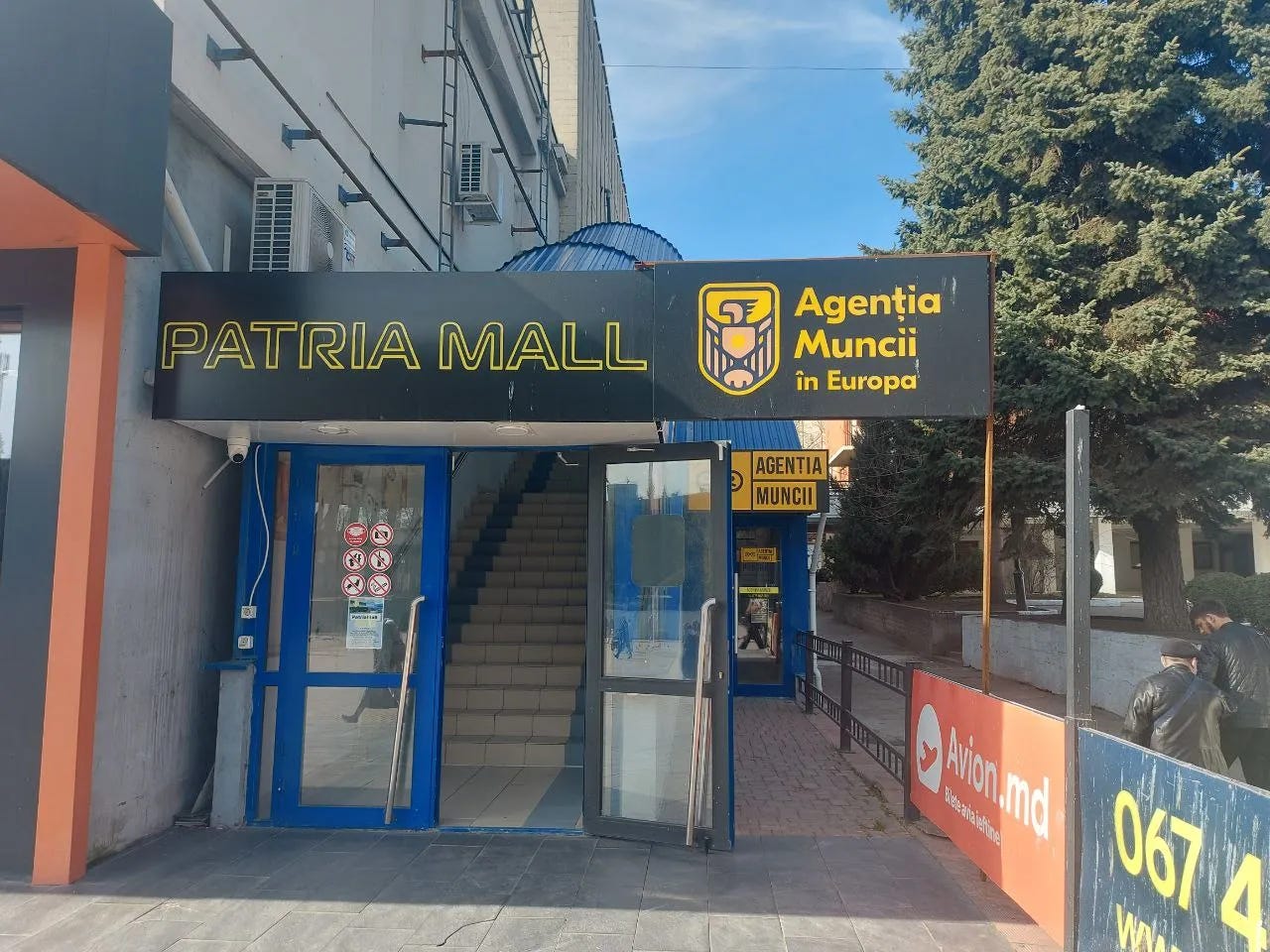Hungary Pardons Far-Right Terrorist, Couriers Unionise in Slovenia
This week's selection of news from the region.
Issue #3 of East European Context (EEC), a newsletter of the Eastern European Left Media Outlet (ELMO).
Many of us experience every day the systemic lack of news regarding the social realities of Eastern Europe, the absence of context in the information provided by mainstream media, and the internal fragmentation of news sourcing due to the prevalence and effects of social media. EEC aims to fill this void with a weekly newsletter, with the help of journalists and activists from the region. We welcome contributions.
In this issue, we bring news about labour unions, the far right, the economy, and working conditions from Moldova, Romania, Russia, Slovenia, Ukraine, and Hungary.
Please share, distribute, and participate by sending suggestions to easteuropeancontext@gmail.com!
Leading Stories
Wolt and Glovo Couriers in Slovenia Unionise
Mašina
Slovenian couriers working for the Wolt and Glovo platforms announced in mid-April in Ljubljana that they had formed the Couriers' Union, which would operate under the auspices of the Mladi plus trade union.
There were many reasons for organizing this union, as the work of couriers can be very risky. They work from dusk to dawn in all kinds of weather conditions. Some work more than 10 hours a day, 6 or 7 days a week, just to earn a decent wage. They are involved in road traffic and are often in accidents, with cyclists and motorcyclists being particularly vulnerable.
"We have warned on several occasions about the poor situation of the couriers, but the main reason for organizing a union now is the deterioration of working conditions and, at the same time, the total indifference of the management to our problems," said the union's press release.
The new union called on Wolt and Glovo to start negotiations immediately to improve working conditions and regulate the status of couriers. They also announced that they would start organizing industrial actions (strikes) if the management does not agree to cooperate.
A recent study about the experience of Glovo workers in Cluj, Romania, can be also found here.
Couriers from Croatia have also recently begun to organize, while in Serbia the discontent of the Wolt workers gained visibility, as they recently protested in public in their uniforms – something they had never done before.
Decentralized IT Workers Union in Romania
Cross-Border Talks
The Romanian IT workers’ labor union SITT started in 2009 as a company labor union in Alcatel-Lucent and has grown into a national union with around 8000 members working in IT multinationals present in Romania, such as Atos, Nokia, Accenture, HP, Infosys, Tech Mahindra.
Florentin Iancu, the president of SITT, declared in an interview taken by Vladimir Mitev: "We are now present in around 11-12 companies. We’ve negotiated more than 20 agreements, collective agreements covering around 16-17,000 workers in the sector. All of the agreements have regulations that cover salaries, bonuses, compensation for extra time, social packages in case of layoffs, and all situations related to holidays, extra days off, and so on."
Commenting on the role of the IT workers' labor union in the general work climate, Iancu underlines the importance of challenging the dominant narrative, which claims that foreign companies will leave if workers organize:
"Companies will always try to block it and say whatever they want. But I think what’s important to underline from our story is that all of these agreements have been their first-ever agreements since they were present in Romania. They are still in Romania 15 years later. Even if we negotiate these kinds of terms and conditions, they do not leave. Foreign companies have the money to pay for these kinds of conditions, better conditions, even in Romania, Bulgaria, or anywhere else in the east. Corporations have the money to pay for conditions similar to the West. They have the money to do lots of things."
Iancu also shares his insights on the organizing philosophy of SITT: "We try to make our union as participatory, democratic, and transparent as possible. If there is one thing that people want nowadays, especially young people, it is to trust the union's leadership and to be part of the way the union behaves. In our case, if we are in a collective negotiation and a final offer from the company comes, nothing is decided by an in-group. Decisions are taken by the workers themselves. (...) So it’s not a very bureaucratic, centralized organization. It is a decentralized, completely open organization in which members have the biggest power and not, for example, me as a president. I don’t have any veto rights. I can’t decide anything myself. Workers are the owners of this process. And that’s something that helped us make sure that lots of young people join".
Since 2010, the value of the Romanian IT sector has quadrupled to up to 4.9 billion EUR. Growing cities like Cluj have given priority to the IT sector, counting 1200 IT companies and more than 20,000 employees, and aiming to become a “major digital hub in Eastern Europe”. Although the IT sector enjoys more visibility, both the ITC industry and the Construction industry have been equally vital to the growth of the Romanian economy, contributing over 6.5% each to the Romanian GDP. The average monthly wage in the IT&C sector was 10234 RON in 2023 (2041 EUR), compared to reportedly 6830 RON in Constructions (1362 EUR) and the national average of 4270 RON (851 EUR). The Romanian IT sector continues to work predominantly for the foreign capital of the outsourcing global economy.
Hungarian President Pardons Far-Right Terrorist on Pope Francis’ Visit
Mérce
President of Hungary, Katalin Novák, has pardoned György Budaházy and six others –who were convicted of the most serious political crimes since 1989 (terrorism under Hungarian criminal law) – on the occasion of Pope Francis' visit. The unprecedented decision has sparked serious outrage, with critics claiming that it is a serious abuse of presidential power that hardly serves the official intended purposes of increasing trust in institutions or correcting the moral blindness of the legal system, but rather minimizes the crime. Over the years, Budaházy has regularly harassed non-white Hungarians and foreigners, Jews, gays, and leftists. He claims to be a radical nationalist and also has strong ties to László Toroczkai, the parliamentary group leader of the far-right Mi Hazánk (Our Homeland) party. It is also worth mentioning that in recent months, Fidesz and its henchmen have made serious attempts to discredit and threaten left-wing groups with unfounded accusations of “Antifa terrorism” (see Issue 2 of EEC).
Budaházy and his associates were accused of several crimes committed between 2007 and 2009, including carrying out Molotov cocktail and bomb attacks on the properties of members of the then socialist-liberal government majority, gay nightclubs, and a ticket office, and assaulting a presenter on Hungarian Hír Television, former socialist politician Sándor Csintalan. Apart from the assault on the presenter, there were no other personal injuries resulting from the attacks.
The so-called Hunnia trial lasted for almost 15 years. Budaházy was arrested in 2009, but the first verdict was not delivered until 2016, when he was sentenced to 13 years in prison for criminal conspiracy, terrorism as an accomplice, as an instigator, assault, and coercion. He received more severe and lighter sentences over the years. Budaházy spent more than 3.5 years in custody and left Vác prison on horseback on April 27, one day before Pope Francis' arrival.
Land Grabbing in Ukraine
Oakland Institute, Al Jazeera, Farmer
In the 1990s, guided and supported by the IMF and other international institutions, the government privatized much of Ukraine's farmland, resulting in the growing concentration of land in the hands of a new oligarchic class. To stop this process, the government instituted a moratorium in 2001, which halted further privatization and prevented almost all transfers of private land.
More than 28 percent of Ukraine’s arable land is in the hands of just a dozen large agribusiness firms. Most of these firms are registered overseas, in tax havens. It is believed that the remaining land is used by over eight million Ukrainian farmers, although comprehensive data on the status of land tenure in Ukraine is lacking.
As a precondition for European integration, the EU also imposed legally binding political and economic reforms to privatize the economy, as codified in the 2014 Association Agreement and Deep and Comprehensive Free Trade Areas (DCFTA), which entered into force in 2017. A key condition of Western aid has been to lift the moratorium on the sale of agricultural land and the creation of a land market.
The moratorium was lifted in 2021. The timing of the bill's passage coincided with mandatory COVID-19 stay-at-home orders in place across the country, effectively quelling any protests or demonstrations. Starting in July 2021, the law makes it possible for individual Ukrainian citizens to purchase up to 100 hectares. The second stage begins in January 2024 and would raise the limit to 10,000 hectares and permit sales to legal entities.
Although a longstanding prohibition on foreign individuals and companies buying land in Ukraine remains, they retain the ability to lease land. However, the few concessions included in the final version of the bill are inadequate in preventing further consolidation of land ownership.
While the moratorium prevented further purchases of land, farmland could still be leased. Many small landowners leased their land to both domestic and foreign corporations, with some large corporations encouraging their employees to purchase land and lease it to them.
Ukraine's small to medium-sized farmers play a crucial role in guaranteeing the country's food security. They produce over 50 percent of the country's agricultural output, including 99 percent of potatoes, 89 percent of vegetables, 78 percent of milk, and 74 percent of beef. Yet, most small farmers have very limited access to financing, which favors large farms and agribusinesses.
In addition to blockading Black Sea ports, destroying infrastructure, and seizing Ukrainian grain, the Russian military has also targeted agricultural facilities. It is estimated that landmines are present on around 10 percent of Ukrainian farmland. President’s Zelensky’s recent meeting with the management of the financial corporation BlackRock has also raised concerns about the selling off of lands and agricultural resources to the Western giant.
In December 2022, a coalition of farmers, academics, and NGOs called on the Ukrainian government to suspend the land reform law and all market transactions of land during the war and post-war period "in order to guarantee the national security and preservation of the territorial integrity of the country during wartime and the post-war reconstruction period."
They also asked for the adoption of the Law “On the Agrarian System,” which recognizes peasant farms and farming households as the basis of Ukraine’s agrarian system; the creation of a national institution protecting the rights of peasants, family farming, and the rural environment; and the formation of state programs that establish regional networks of local agricultural markets generating short supply chains and incentivize food self-sufficiency through the production of domestic seeds.
Work in Moldova
Platzforma
Platzforma has published a general analysis of the situation of work in the Republic of Moldova based on the latest data available, which is up to September 2022.
The findings show that almost two-thirds of Moldova's workers (65.8%) receive less than the official average monthly wage (10,353 lei, 525 EUR). Of the total number of wage workers, 41.8% are paid less than 7,000 lei per month (355 EUR), and only 15.1% have monthly wages of more than 15,000 lei (761 EUR). These conditions have made Moldova a net exporter of its workforce, while the local shortage of work is felt even more acutely. In 2022, there were 12% more vacant jobs reported than in 2020.
However, the local process of value extraction continues to rely on the informal economy, which reportedly employs one-fourth of Moldova's available workers, particularly in agriculture, construction, and commerce. This phenomenon also affects the local population and refugees from Ukraine.
Although official data suggests that only about 1,000 refugees from Ukraine are currently employed in Moldova, Platzforma and the associated project ROBOTA have interviewed several refugees who confirmed they have been informally hired as daily workers, especially in agriculture.
In 2022, the Labor Code of Moldova underwent several changes, all geared towards attracting investors and foreign capital by making work more flexible. These changes include extending the test period of employment from three to six months; introducing a non-competition clause, which forbids employees from applying, after being fired, to jobs at potential competitors of their former employer; introducing new means for the control of workers such as the procedure for evaluating individual employee performance; and limiting compensation for being transferred or laid off.
According to reports, Moldova received 2.2 billion USD in remittances from migrant workers in 2022, which constitutes 15.4% of the national GDP. As in almost every year since 2013, the amount of remittances sent by migrant workers to Eastern Europe and Central Asia (approximately 70 billion USD) far exceeds both the amount of foreign direct investment (approximately 40 billion USD) and official development assistance (approximately 10 billion USD). However, government policy continues to favor capital over workers.
Russian Federal Penitentiary Service seeks authority to send inmates to construction sites in war zones
ng.ru
A bill is being considered by the government that would grant the Federal Penitentiary Service the authority to "relocate" prisoners to colonies in other regions for employment reasons. The government has been keen to increase the number of employed prisoners for some time; for example, in 2016, only about 33% of them were employed, but by now that number has risen to 70%.
Human rights activists are concerned that the bill is intended to provide a workforce for reconstruction in regions newly annexed by Russia. Disenfranchised prisoners would not be required to be paid extra for their hard work and the dangerous conditions they face.
Prisoners' rights advocates have long suggested that the Federal Penitentiary Service should honor its previous commitments to provide "decent conditions" for convicts, mainly through employment contracts with market-level wages. For example, there were cases when convicts worked long hours at a factory (12 hours a day for six days) and received only 500 rubles (about 6 euros) per month. According to official figures, 40% of prisoners had less than 0.01 rubles in their personal account, and another 15% had less than 200 rubles.
Forced relocation of prisoners also raises concerns about whether the distance from home would create obstacles for visiting relatives, or whether the authorities would ensure that there is no overcrowding in such “working” colonies.
Advocacy groups have criticized the initiative, arguing that it prioritizes the interests of big business over the rights of the inmates.







